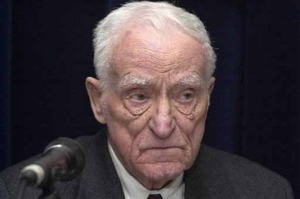Although Claude Ryan died ten years ago he remains a moral presence in Quebec. As a measure of his ongoing influence, former Prime Minister Brian Mulroney, NDP Opposition Leader Thomas Mulcair and former Quebec Premier Jean Charest will take part in a seminar at the Newman Centre on Peel St. February 13 and 14 marking the 10th anniversary of Ryan’s death.
As well, the first volume of Michael Gauvreau’s two volume Ryan biography is about to be published.
 Mr. Ryan, who was influenced by the writings of Cardinal John Henry Newman, a 19th century convert, embodied the Christian values of modern Quebec. He was a man of strong federalist convictions, defending individual rights, democracy and social justice. As the esteemed editor of Le Devoir for 15 years in the 1960s and 70s, and as leader of the Quebec Liberal Party in the 1980s, Ryan was known as “:the secular Pope of Quebec.” The image was rooted in his background. Born in Montreal on January, 26, 1925, he and his two siblings were raised by their single parent mother. While she came from a well-heeled family, she raised her family on a $60-dollar a week salary after her husband deserted her. Mr. Ryan might have become a priest, but after two weeks with the Cistercian’s he declared that he was “too much of a mule to take a vow of obedience.”
Mr. Ryan, who was influenced by the writings of Cardinal John Henry Newman, a 19th century convert, embodied the Christian values of modern Quebec. He was a man of strong federalist convictions, defending individual rights, democracy and social justice. As the esteemed editor of Le Devoir for 15 years in the 1960s and 70s, and as leader of the Quebec Liberal Party in the 1980s, Ryan was known as “:the secular Pope of Quebec.” The image was rooted in his background. Born in Montreal on January, 26, 1925, he and his two siblings were raised by their single parent mother. While she came from a well-heeled family, she raised her family on a $60-dollar a week salary after her husband deserted her. Mr. Ryan might have become a priest, but after two weeks with the Cistercian’s he declared that he was “too much of a mule to take a vow of obedience.”
At 20, he quit the University of Montreal School of Social Science and Industrial to become the national secretary of the Action Catholique Canadienne movement. The organization was the lay reform movement of the church, which opposed the clergy's domination of Quebec in 1950s and laid much of the groundwork for the Quiet Revolution in the 1960s.
Mr. Ryan held the post for 17 years -- except for a two-year absence to study at the Gregorian Pontifical University in Rome. His opposition to Quebec nationalism didn't prevent him from defending his belief that Canada has two founding nations -- the French and the English -- and that Quebec should be recognized as a distinct nation within Canada. His often stern and authoritarian style didn't endear him to voters; he lost the election to Rene Levesque.. But he overcame his shortcomings by defending the need for a new constitution, which he called a "new political entente between the rest of Canada and Quebec." He proposed a "third way" between status quo federalism and sovereignty. He was determined to defeat the separatists in the referendum and to take office to obtain for Quebec all the powers it needed as "a truly distinct national community" within Canada. After he left politics he lecturered in the Catholic Studies program at McGill until his death in 2004. When he died donated his extensive library to the Newman Centre.
A memorial Mass will be celebrated at the Centre, 3484 Peel St at 5 p.m. on the anniversary of his death, February 9th, and a commemorative service will be held in the Ryan Library of the Newman Centre on the 13th, which is the anniversary of the funeral.

























Commentaires
Veuillez vous connecter pour poster des commentaires.